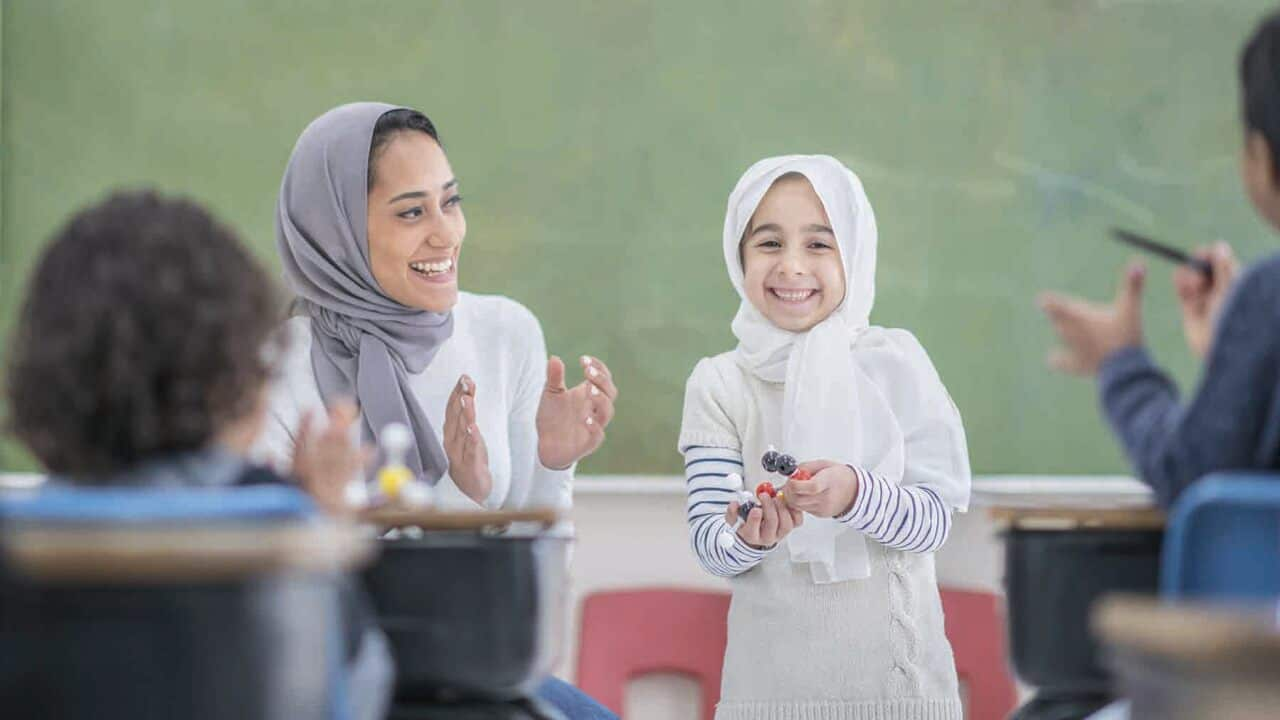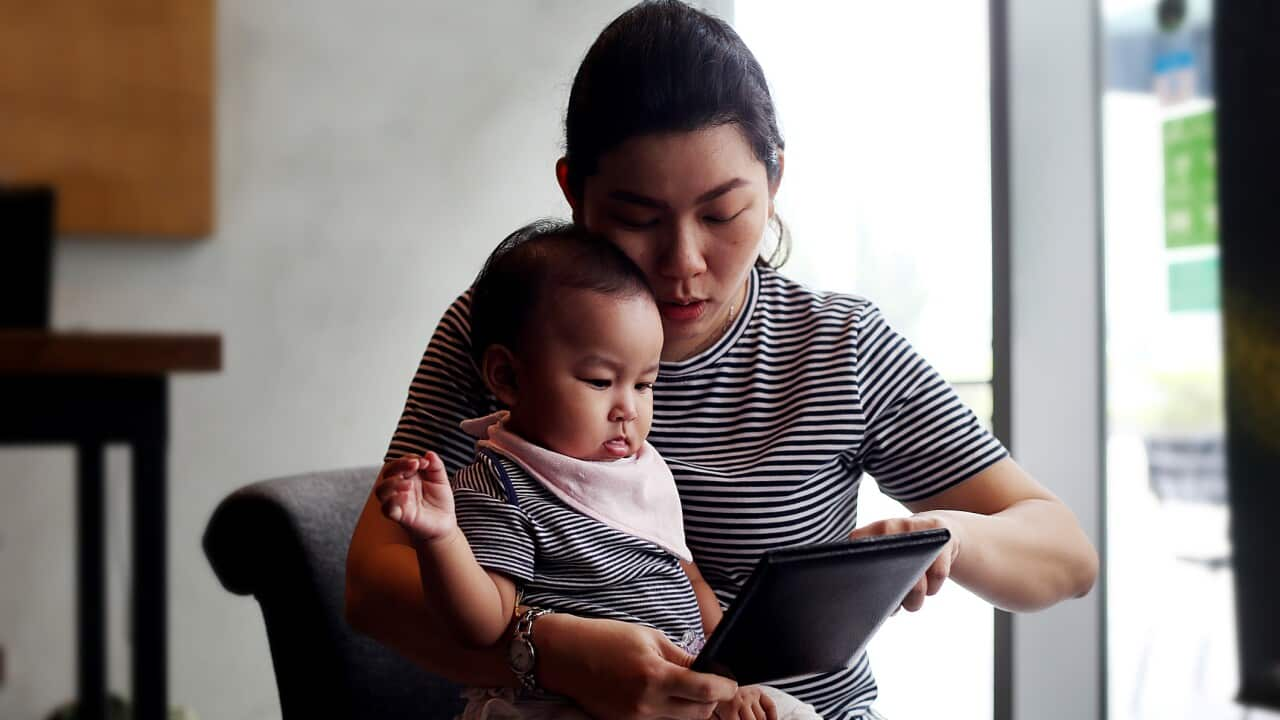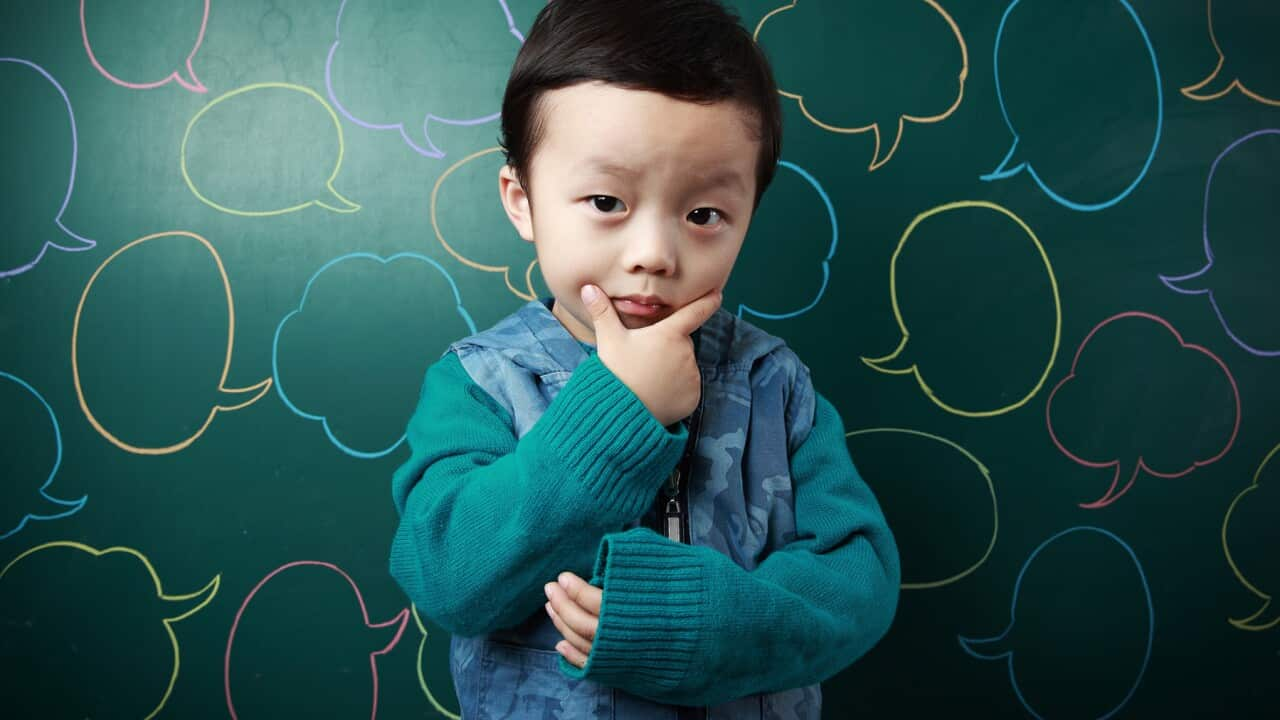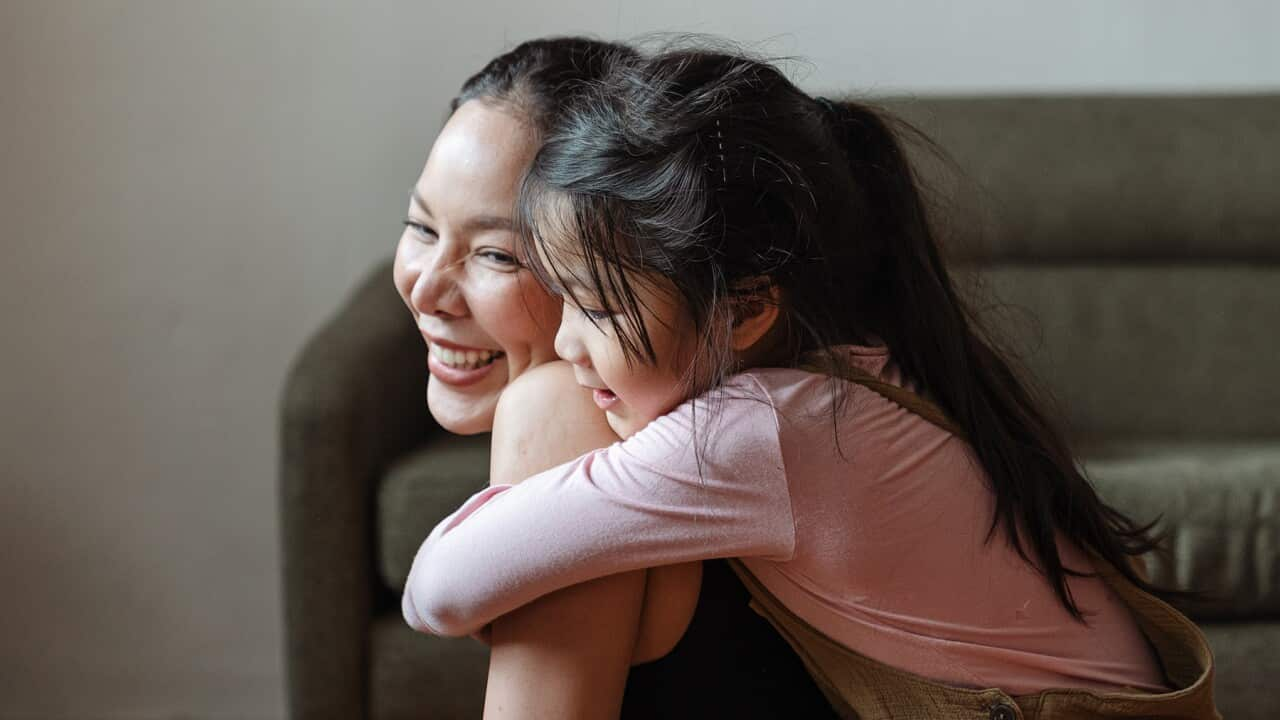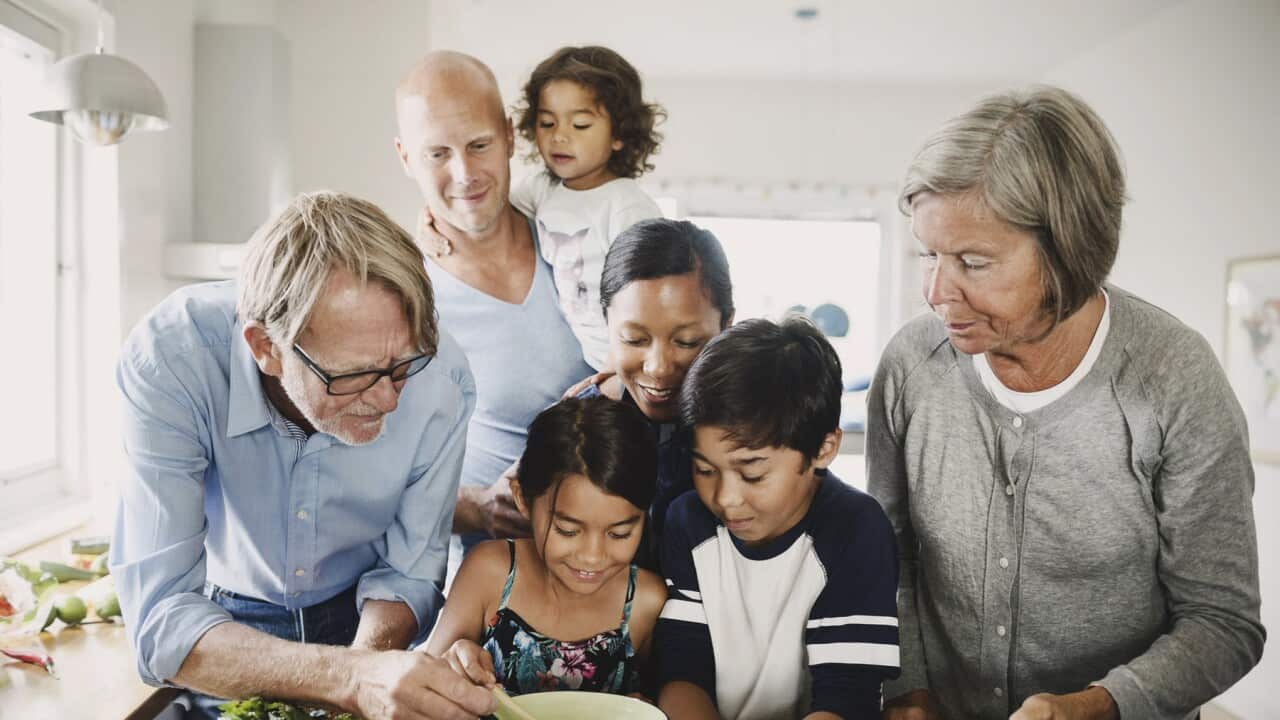Speaking your language, especially in public, can reinforce a sense of not belonging in places where you are a minority, and even result in poor treatment for speaking a language other than English.
In episode 4, we discuss how language use can invite discrimination and racism, and how that can make it difficult to persevere with bilingual parenting. As adults, we want to protect children rather than expose them.
But overcoming feelings of shame can lead to finding a different way to move through the world. And passing on a strong sense of pride about your language and culture contributes to a strong foundation for future learning and understanding.
In this episode we talk to Dr Helen Ngo, a philosopher specialising in race and feminism.
is hosted by Dr Elaine Laforteza. Produced by Masako Fukui and Sheila Ngoc Pham.
Follow in , , , or the for more episodes.
Transcript
We would like to acknowledge the Traditional Owners of the land we’re broadcasting from today, and we pay our respects to the Cammeraygal people of the Guringai Nation and their elders past and present. We also acknowledge the Traditional Owners from all Aboriginal and Torres Strait Islander lands you are listening from today.
ELAINE (host): Elaine Laforteza here again. You’ve just caught me eavesdropping on an interesting conversation between Maram and Hana. They’re two producers at SBS Arabic24. And they also happen to be bilingual mums.
Maram: Now I'm talking from one mother to another. But you know, what are really our motivations or what is so important about passing the language that you know, it's an extra effort on us anyway and on them as well. So what do you think?
Hana: It’s how you see language and what role it plays in your life. I remember when he was little I and his dad were watching an old Egyptian movie we loved. And we remembered our childhood and the first time we saw it, and my husband just looked at my son and he said, do you think when he will grow up he will understand and appreciate our culture? What does this song, this movie, this joke means for us? And it's this conversation, this question stayed with me. Like especially when I am very involved within Arabic media. I would be doing like an amazing program interviewing people, and I’ll go back, switch to English with my kids, and think, wow, my kids will not know what impact Arabic language has on people in Australia. This added even more anguish for me. It's like wow, and my kids can't relate to it if they don’t understand the role we play within Australia, as Arabic speakers.
ELAINE: If you ask parents why they think passing on their mother languages is important, nearly all of them would agree with Hana - it’s important because languages are the keys to our cultures.
But in Australia, when your main language isn’t English, using it on a day to day basis is not always straightforward. Especially when we come up against racist attitudes.
Hello! Welcome to another episode of My Bilingual Family. I’m really happy you’ve been able to join me to discuss more questions and more stories about raising kids bilingually. For many of us, the feelings associated with our mother languages are extremely powerful. Hearing and speaking our languages can connect us to the deepest part of ourselves, which is why, sometimes, really uncomfortable emotions can come to the surface. Feelings like grief, anger, and shame.
We’ve received a letter on just this topic. The writer of the letter is abilingual mum, whose mother language is Vietnamese. But bilingual parenting didn’t work for her. She writes:
‘There was and is always going to be a part of me that is embarrassed by the language - how it sounds - and just the fact it’s Vietnamese, and there was a lot of racism in the eighties, when I was growing up. The shame is ingrained, even though I am proud to be Vietnamese now.
‘I only lasted a day speaking Vietnamese to my daughter. It’s just not the gentle language I want to use with my child, and I really struggled with the Vietnamese patriarchal hierarchy that should be addressed in language.’
It’s interesting that this bilingual mum says she’s embarrassed by how Vietnamese sounds. She’s saying that the language makes her feel out of place, not quite belonging, and speaking Vietnamese to her child triggers these feelings.
So where do these feelings of shame and embarrassment about our languages come from? To help me dig deeper, I’m speaking with an academic based in Melbourne, Dr Helen Ngo, and she’s pretty cool, she’s a philosopher.
Helen: I come from a refugee family, from Vietnam, we’re Chinese Vietnamese and I grew up speaking a couple of different dialects, but predominantly Cantonese became the dominant tongue that we continue to speak in at home.
Elaine: Can you tell me a little bit more about what you do and how this relates to language and also what that means in terms of bilingual parenting?
Helen: I'm really interested in looking at questions of racism, starting from the lived experience of racism and what that feel like. And as I became a mum and decided that I would try parenting bilingually, I noticed that that reconfigured my lived experience of the world in ways that also touch on underlying questions of race and racism as well.
Elaine: I really like how you phrase that in terms of the ‘lived experience of racism’, and I've come across this letter which is from a mum who shares that bilingual parenting didn't quite work for her and part of the reason was, and she says, ‘and there was a lot of racism in the eighties. The shame is an ingrained feeling even though I am proud to be Vietnamese now.’ And that sparked something when you said that lived experience of racism, and so how do you think that challenges people to speak their language and then try to teach it to their children? Is there shame involved in trying to articulate yourself in your mother tongue?
Helen: I think maybe the first thing to acknowledge is that we live in a country that has a very, very deep history of racism and settler colonialism where language played a really big role.
At the point of invasion we had 250 different Aboriginal languages and some six to eight hundred dialects spoken. We had the White Australia Policy where non-European migrants could be made to sit a dictation test. It's a country where we’re sort of steeped in this tradition whereby in particular the English language is prioritised and valued.
Moving into a more contemporary context, I think we see the commitment to English as the dominant language in many different ways. The letter writer talks about the racism they experienced in the eighties, and being Chinese Vietnamese myself, I certainly relate to that and remember that. The rise of Pauline Hanson and One Nation in the nineties, the sense of moral panic that we saw played out really publicly when languages other than English had too much visibility in public life. So too many signs of restaurants and stores et cetera in other languages. There was a sense of oh, you know the Asians are taking over. Even though the public discourse and public sentiment has moved some way from that, I don't think it's disappeared. I think it's still there in many different forms.
I see it even recently in social media groups where I've seen people get worked up because there were billboard signs that were not in English. And ironically they were advertising classes for people to improve their English and yet there was still this kind of panic of why are there so many signs that are not in English, and this is you know today.
It can be quite a hostile environment in which to speak a language other than English and sometimes some of that gets internalised such that you can feel this sense of shame.
Sheila reading to her kids in Vietnamese.
ELAINE: That’s my producer, Sheila. She’s also a bilingual mum, and here she’s reading a bedtime story to her kids in Vietnamese. Her kids are adorable…and this feels like the most natural, ordinary, daily family activity, which of course it is.
Speaking our family languages is fine as long as it’s inside thehome, but when those languages are heard in public spaces, somehow they’re seen as out of place. But of course, this doesn’t apply to all languages…
Helen: European languages, they take on a very different meaning and value in our public life than lesser known languages or languages that kind of play along racialised lines. French, German, Italian are not just ones that have been taught for very many years in schools et cetera, but they're ones that I think there's a general intrinsic valuing of the richness and the beauty that they hold, whereas Asian languages being taught in schools they're valued insofar as it's seen as instrumentally useful. They're not necessarily seen as beautiful languages or philosophically rich languages. So I think there is definitely a different valuing of different languages that is in step with the racial and colonial history of this country.
Sheila reading to her kids in Vietnamese.
ELAINE: It’s heartbreaking to think that shame you might feel about speaking your language can actually prevent you from experiencing precious moments, moments like storytime before bed in your mother tongue.
But there’s another kind of language shame that new migrants especially might have to contend with. And that’s around speaking English.
Helen: It's the first thing that migrant communities and refugee communities get criticised for if they don't speak English well enough. I think migrants, particularly non- white migrants, are held to a different kind of standard whereby they're expected to sort of assimilate and integrate. And a big part of that means speaking English and leaving their primary language behind or leaving it behind closed doors.
It's quite telling to me because it shows how there’s such an undervaluing of the linguistic agility that migrant communities really have. I'm always struck by how much agility there is. You go to an Asian grocery store, and a cashier will speak Mandarin, Cantonese, Hokkien, Teochew, Vietnamese, and English. But that doesn't get recognised. The dominant narrative that you get is that they're not speaking English well enough and if it's accented English, that also counts as not well enough.
ELAINE: I really like Helen’s idea of linguistic agility, it makes me think it’s like yoga of the tongue, languages flexing and bending to help us manoeuvre our lives. And this is the multilingual reality many of us live in, using languages in all kinds of situations, and yoga of the tongue - or pilates - or yogalates - if you prefer - is just part of our linguistic repertoire.
When I speak with my kids and mum, for example, I use a mix of English, Ilocano and Tagalog. There’s something about just using one language that can’t quite capture what I often try to say.
Kasla kastoy, when in the depths of mummy love, I say to my kids: Mahal kita mga anak ko. I love you sobrang sobra. Nag gasat ak na nanang. My Lola, my grandmother, used to say the same things to me when she was alive: I love you, sobrang sobra. So, I echo her love through my bilingual turn of phrase.
But as Helen says, this multilingual agility is often not recognised or valued. And it’s another way to make us feel out of place, like we don’t belong.
So is there an alternative? A different approach that takes a detour around these feelings of shame and not belonging, yet still values our linguistic and cultural heritages?
To look for some answers, let’s take a trip, well, a virtual trip, into the country, to Central West New South Wales. This is where Elissa lives.
Elisa: (self introduction in Bahasa Indonesia)
ELAINE: Elissa was born in Australia, but her parents are from Indonesia, so Elissa speaks Indonesian. Mind you, her parents also speak a number of other languages between them, including Arabic, Javanese, and Sundanese.
Elissa married a Lebanese man, who speaks Arabic, so the family language pool is rich and diverse. Elissa and her husband actually brought up their four kids in English, so not in any of these other languages. English is the language that plays a central role in Elissa’s sense of Australian identity.
Elissa: I mean, I'm born and raised in Australia and I do view myself as an Australian. However, if I was to walk down the street I'm pretty sure I wouldn't be identified as an Australian. I'd be like that Muslim lady, or you know that Asian lady. And even here with my colleagues and I'm the first Asian person they've interacted with; I'm the first Muslim person they've interacted with. I am a primary school teacher and I have 30 sets of eyes that look up to me every single day. And even though I'm in regional New South Wales there is a small minority of ethnic children or of Muslim children. And I need to show them, hey, I am an Australian and even though I wear this long flowing scarf and you know, I might not look like all the other teachers, I definitely think like them and I speak like them, and I promote all the positivity in just the same way. And I need these little eyes that are looking up to me to understand for themselves that they can say hey, I can be a contributing Australian citizen but I can totally embrace my identity, whether it be Lebanese or Iraqi or Chinese and not look like what people perceive to be what an Australian is.
ELAINE: Elissa is a brilliant role model to those kids, and I can imagine her standing in front of her class with her ‘long flowing scarf’...
She says she sees herself as a ‘bridge’, for all her students who, like her, look different, but are trying to find their place in Australian society. And I’m hearing some familiar themes in what she says - firstly, this idea of being too visible. A Muslim woman in a country town…well, she’d be really hard to miss. And this reminds me of what Helen said earlier. About how certain non-English languages are seen as being too visible in public spaces, and the moral panic that can arise. Given our history of language discrimination and racism, it’s not surprising that Elissa prioritised English. But that doesn’t mean she turned her back on her other languages. Arabic and Indonesian have always been present in her children’s lives.
Elissa: I have to say that I didn't try to teach them Indonesian. Like now and then I will speak to him in Indonesian just if we're joking around really. And my daughter herself who is now in year eleven, has decided that she wants to learn Indonesian on her own. So she's actually gotten dictionaries and textbooks and apps, and is trying to read and understand and practice and sometimes she practises her words on me. And that's why I do support it with my daughter because maybe if she understands the language then she can articulate herself better, and be who she wants to or needs to be.
Where I'm at now in life, I realise that I should have jumped on every opportunity with teaching my kids Arabic or cultivating the Indonesian. My mother in law has passed on. My dad's passed on as well so even when we go over to mum and dad's, they're not even being exposed to her and my dad speaking Indonesian or Javanese, so those opportunities are lost without even realising. It saddens me so yeah. You know, my mother in law was always encouraging, and same with having that environment at my parents' house with Indonesian. But I guess not all is lost with Indonesian because I speak it and understand it myself, and you know mum is still around and I can encourage that.
ELAINE: Elissa may not have brought up her kids bilingually from an early age like me. But her kids have always had something that’s really important when passing on language. Throughout their childhood, the kids would spend a lot time with their grandparents. Their homes are what linguists would call ‘an immersive language environment’. So that’s where they could hear a lot of Arabic or Indonesian. Remember in Episode One, when sociolinguist Dr Loy Lising explained that language acquisition is like a muscle. It needs constant exercise in a rich language context. This is a key concept in linguistics, so we’ll come back to it in later episodes. So, thanks to the grandparents, all of Elissa’s children have some understanding of one or more of the languages in that rich mix. And now, one of her daughters has taken the initiative to learn Indonesian. How good is that.
Some philosophers have described language as a home or dwelling, and this is such a good metaphor. Because being comfortable speaking our language is like feeling at home in our own language.
Helen: So going back to Elissa, who in her story talks about how she didn't choose to parent bilingually in her case, I think it goes to show how you know, there are of course so many different ways that we can carve out homes for ourselves. And in her case it seemed important to her that being Australian meant speaking English, and you know, she seemed to have a lot of pride in presenting a different face of what it meant to be Australian.
Elaine: Yeah, if I could just speak to that as well, Helen. Elissa’s story reminds me so much of my mum too that she's made this investment in English. She never actively taught me Ilocano, it was more she was speaking to me because that is her predominant language. But I didn't have lessons as such, there were no books, educational materials in Ilocano for me. Interestingly, I found I really related to Elissa's daughter, because now her daughter who's in year eleven, is now taking the initiative to learn Indonesian for example, via youtube, apps, and so on. And I did that at a similar age. And so I started educating myself, so I find that really interesting that within the dwellings that Elissa and her daughter have made there are different rooms in this dwelling right?
Helen: Absolutely, yeah.
Elaine: Like Elissa is - I'm speaking English, this is what connects me to Australia, this is my home. And her daughter is like - but I also want to learn Indonesian. But of course in a more tech savvy way than I ever did.
Helen: I think there are many different approaches, some which might not entail an active bilingual parenting. In Elissa’s case it sounds like she was always very open or speaking languages other than English is something that's still underlyingly valued, and I think that still plays an important role even if you're not actively speaking your home language. So for example, I know of people who made the active decision not to be parenting in Cantonese in this case because they grew up with a lot of negative associations with it as a child, and they didn't want to pass on those negative associations. So sometimes it's about creating the space whereby speaking the language other than English can become a positive thing, and maybe it gets taken up in its own time.
Elaine: So where could pride be enabled through bilingual parenting?
Helen: Many people who grow up experiencing their language as a source of shame, whether that's because they don't think they speak it well enough or because they are ashamed to hear it being spoken in public, if you're parenting in that language you need to reclaim that language in a sense right? Because you can't parent in a language that you continue to be ashamed in, that's not modelling that well for your child. So I think there can be a kind of you know, a rewriting of that story through parenting.
Thinking back to the anonymous letter, where the author speaks about the decision not to parent bilingually because she felt herself sounding too harsh in Vietnamese, again that's something that I really relate to because my parents, they had certain you know, work and economic demands, which meant that they had to parent in a certain way. So the language that I know how to use in the family context might be a bit harsher than what I would want to be as a parent. Interestingly, I think the experience of parenting bilingually sometimes means that you need to search out new language, you need to search out a new vernacular. Also you know, even though our languages come with a certain kind of history, the experience of parenting bilingually, you start to inhabit these languages differently. And you can carve out different ways, different personas even in a certain language that I think can kind of bring pride back into the picture.
Elaine: I love that so much Helen, in terms of just you become different personas and that language is this living, breathing, continuous…it gets reworked, it's reshaped, it's linguistic flexibility and yoga or pilates or whatever else you want to throw at it. But how does that work in terms of your own parenting?
Helen: I think certainly growing up it was a language that I felt quite embarrassed to speak publicly. And I still maybe have a little bit of that, because I don't think my Cantonese is that great, but you need to sort of learn to feel comfortable in this language again that you may not have at certain points of your life, and also to learn to feel okay with the imperfection.
And I guess the other significant thing I've noticed is that it's really reconfigured my social interactions in the world. I find that when I'm out and about and I'm conversing with my kids, I might be at a grocery store or bakery et cetera and I am chatting with them and the cashier hears that and then they will speak to me in Cantonese. And I think there's a gesture of recognition. Just that interaction all of a sudden that they switch to me, to a different tongue that might not have happened had I not been out in the world chatting to my kids in Cantonese. So, to me that's a really poignant moment. It means the world opens up to me in a different way as well. And that's been a really… yeah, profound experience.
Elaine: But for me if I can share this, this was a few months ago when my bub, just before he turned two, and we were out and about just doing the grocery shopping and he was speaking, he was speaking in Ilocano. And someone came to us and thought he was really cute and he spoke to her. And this person said oh that's so cute he's babbling, he doesn't know how to speak yet. But actually I thought he's actually saying he's pooed in his nappy, like I love that moment because he's basically said all this to the woman, and she's saying, oh look at the cute baby babble. I’m like, he’s actually saying can you please change my nappy….
Helen: Yeah, yeah, yeah, yeah, yeah, that's really lovely. There's a world that you create with your child through this as well and that's something that's very special.
Sounds of Elaine with her son and cat.
ELAINE: Well, that brings us to the end of another episode of My Bilingual Family.
You know, one of the main takeaways for me, is that the kind of home we create through our languages doesn’t have to be perfect. And that’s okay. And also, valuing our languages is so important. And this is beautifully expressed by our SBS Arabic24 producers.
Maram: Do you ever worry about him for example being at a disadvantage because of the home language?
Hana: No, never, I think it’s a….in a multicultural Australia, it shouldn’t be…
ELAINE: Well, I can’t argue with that.
I hope you can join me next time, when we take a good hard look at why we might feel like we fail as bilingual parents, no matter how hard we try. We might blame ourselves for not doing something right. But more often than not, the obstacles are forces way out of our control.
So, looking forward to your company for that discussion. And if you want to get in touch, is where we are. Hope to hear from you.
Thanks to everyone who shared their stories with us, and a very special thanks to Luke Wong for introducing us to Elissa.
Until then, maraming salamat! Catch you next time on My Bilingual Family.
